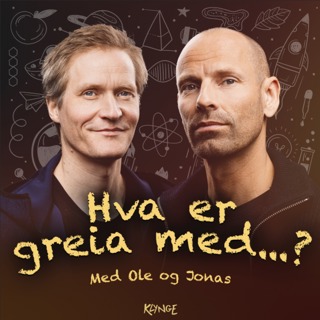
206 | Simon Conway Morris on Evolution, Convergence, and Theism
Evolution by natural selection is one of the rare scientific theories that resonates within the wider culture as much as it does within science. But as much as people know about evolution, we also find the growth of corresponding myths. Simon Conway Morris is a paleontologist and evolutionary biologist who’s new book is From Extraterrestrials to Animal Minds: Six Myths of Evolution. He is known as a defender of evolutionary convergence and adaptationism — even when there is a mass extinction, he argues, the resulting shake-up simply accelerates the developments evolution would have made anyway. We talk about this, and also about the possible role of God in an evolutionary worldview.Support Mindscape on Patreon.Simon Conway Morris received his Ph.D. in geology from the University of Cambridge. He is currently an emeritus professor of evolutionary paleobiology in the Department of Earth Sciences at Cambridge. Among his awards are the Walcott Medal of the National Academy of Sciences and the Lyell Medal of the Geological Society of London. Cambridge web pageGoogle scholar publicationsWikipediaAmazon author pageSee Privacy Policy at https://art19.com/privacy and California Privacy Notice at https://art19.com/privacy#do-not-sell-my-info.
8 Aug 20221h 16min

AMA | August 2022
Welcome to the August 2022 Ask Me Anything episode of Mindscape! These monthly excursions are funded by Patreon supporters (who are also the ones asking the questions). We take questions asked by Patreons, whittle them down to a more manageable number — based primarily on whether I have anything interesting to say about them, not whether the questions themselves are good — and sometimes group them together if they are about a similar topic. Here is a link to the Mindscape Big Picture Scholarship. Please consider donating!Support Mindscape on Patreon.See Privacy Policy at https://art19.com/privacy and California Privacy Notice at https://art19.com/privacy#do-not-sell-my-info.
1 Aug 20223h 6min

205 | John Quiggin on Interest Rates and the Information Economy
The idea of an “interest rate” might seem mundane and practical, in comparison to our usual topics around here, but there is a profound philosophical idea lurking in the background: if you lend me money now against the promise of me paying you back more in the future, I am relating the different values that a certain sum has to me at different moments in time. Traditionally, the interest rates set by the government have been a major tool for influencing the economy, but in recent decades they have increasingly fallen near zero. John Quiggin relates this change to the shift from manufacturing to an information economy, and we talk about what that means for the public interest in having information be reliable and widely available. And yes, there is a bit about crypto.Support Mindscape on Patreon.John Quiggin received his Ph.D. in economics from the University of New England. He is currently a VC Senior Fellow in Economics at the University of Queensland. He is a Fellow of the Econometric Society and the Academy of the Social Sciences in Australia. Among his books are Zombie Economics: How Dead Ideas Still Walk Among Us and Economics in Two Lessons: Why Markets Work So Well, and Why They Can Fail So Badly.Web siteUniversity of Queensland web pageGoogle Scholar publicationsAmazon author pageWikipediaTwitterSee Privacy Policy at https://art19.com/privacy and California Privacy Notice at https://art19.com/privacy#do-not-sell-my-info.
25 Jul 20221h 19min

204 | John Asher Johnson on Hunting for Exoplanets
Recent years have seen a revolution in the study of exoplanets, planets that orbit stars other than the Sun (or don’t orbit stars at all). After a few tentative detections in the 1990s, dedicated instruments in the 2000s have now pushed the number of known exoplanets into the thousands, enough to begin to categorize their distribution and properties. Today’s guest is John Asher Johnson, one of the leaders in this field. We talk about the various different ways that exoplanets can be detected, what we know about them know, and what might happen in the future.Support Mindscape on Patreon.John Asher Johnson received his Ph.D. in astrophysics from the University of California, Berkeley. He is currently professor of astronomy at Harvard University. He is the founder and director of the Banneker Institute for summer undergraduate research. Among his awards are the Newton Lacy Pierce Prize from the American Astronomical Society. He is the author of How Do You Find an Exoplanet? Web siteHarvard web pageGoogle Scholar publicationsWikipediaTwitterSee Privacy Policy at https://art19.com/privacy and California Privacy Notice at https://art19.com/privacy#do-not-sell-my-info.
18 Jul 20221h 15min

203 | N.J. Enfield on Why Language is Good for Lawyers and Not Scientists
We describe the world using language — we can’t help it. And we all know that ordinary language is an imperfect way of communicating rigorous scientific statements, but sometimes it’s the best we can do. Linguist N.J. Enfield argues that the difficulties run more deeply than we might ordinarily suppose. We use language as a descriptive tool, but its origins are found in more social practices — communicating with others to express our feelings and persuade them to agree with us. As such, the very structure of language itself reflects these social purposes, and we have to be careful not to think it provides an unfiltered picture of reality.Support Mindscape on Patreon.N.J. Enfield received his Ph.D. in linguistics from the University of Melbourne. He is currently a professor of linguistics and Director of the Sydney Social Sciences and Humanities Advanced Research Centre at the University of Sydney. His recent book is Language vs. Reality: Why Language Is Good for Lawyers and Bad for Scientists.Web siteUniversity of Sydney web pageGoogle Scholar publicationsAmazon author pageSee Privacy Policy at https://art19.com/privacy and California Privacy Notice at https://art19.com/privacy#do-not-sell-my-info.
11 Jul 20221h 24min

AMA | July 2022
Welcome to the July 2022 Ask Me Anything episode of Mindscape! These monthly excursions are funded by Patreon supporters (who are also the ones asking the questions). I take the large number of questions asked by Patreons, whittle them down to a more manageable size — based primarily on whether I have anything interesting to say about them, not whether the questions themselves are good — and sometimes group them together if they are about a similar topic.Big news this week! Mindscape is working with Bold.org to sponsor a college scholarship for students interested in studying the fundamental nature of reality. Listeners can find more details and donate here. Our immediate goal is to raise $10,000, and I will match the first $5,000, so this shouldn’t be too hard for us here. Hopefully we can raise much more! And hopefully this will help encourage someone who might not otherwise have been able to study this kind of topic.Support Mindscape on Patreon.See Privacy Policy at https://art19.com/privacy and California Privacy Notice at https://art19.com/privacy#do-not-sell-my-info.
4 Jul 20223h 26min

202 | Andrew Papachristos on the Network Theory of Gun Violence
The United States is suffering from an epidemic of tragic gun violence. While a political debate rages around the topic of gun control, it remains important to understand the causes and possible remedies for gun violence within the current system. Andrew Papachristos is a sociologist who uses applied network science to study patterns of street violence in urban areas. His research shows that such violence is highly non-random; knowing something about the social networks of perpetrators and victims can help identify who might be at heightened risk of gun violence. It’s an interesting example of applying ideas from mathematics and computer science to real-world social situations.Support Mindscape on Patreon.Andrew Papachristos received his Ph.D. in sociology from the University of Chicago. He is currently a professor of sociology at Northwestern University, and a faculty fellow at the Institute for Policy Research. He is also founding director of the Northwestern Neighborhoods and Networks Initiative.Web siteNorthwestern web pageGoogle Scholar publicationsWikipediaTwitterSee Privacy Policy at https://art19.com/privacy and California Privacy Notice at https://art19.com/privacy#do-not-sell-my-info.
27 Jun 20221h 15min

201 | Ed Yong on How Animals Sense the World
All of us construct models of the world, and update them on the basis of evidence brought to us by our senses. Scientists try to be more rigorous about it, but we all do it. It’s natural that this process will depend on what form that sensory input takes. We know that animals, for example, are typically better or worse than humans at sight, hearing, and so on. And as Ed Yong points out in his new book, it goes far beyond that, as many animals use completely different sensory modalities, from echolocation to direct sensing of electric fields. We talk about what those different capabilities might mean for the animal’s-eye (and -ear, etc.) view of the world.Support Mindscape on Patreon.Ed Yong received Masters and Bachelors degrees in zoology from Cambridge University, and an M.Phil. in biochemistry from University College London. He is currently a staff writer for The Atlantic. His work has appeared in National Geographic, the New Yorker, Wired, the New York Times, and elsewhere. He was awarded the Pulitzer Prize in explanatory journalism for his coverage of the COVID-19 pandemic. Among his other awards are the George Polk award for science reporting and the AAAS Kavli Science Journalism Award for in-depth reporting. His new book is An Immense World: How Animal Senses Reveal the Hidden Realms Around Us.Web siteStories at The AtlanticPulitzer citationWikipediaAmazon author pageTwitterSee Privacy Policy at https://art19.com/privacy and California Privacy Notice at https://art19.com/privacy#do-not-sell-my-info.
20 Jun 20221h 9min




















